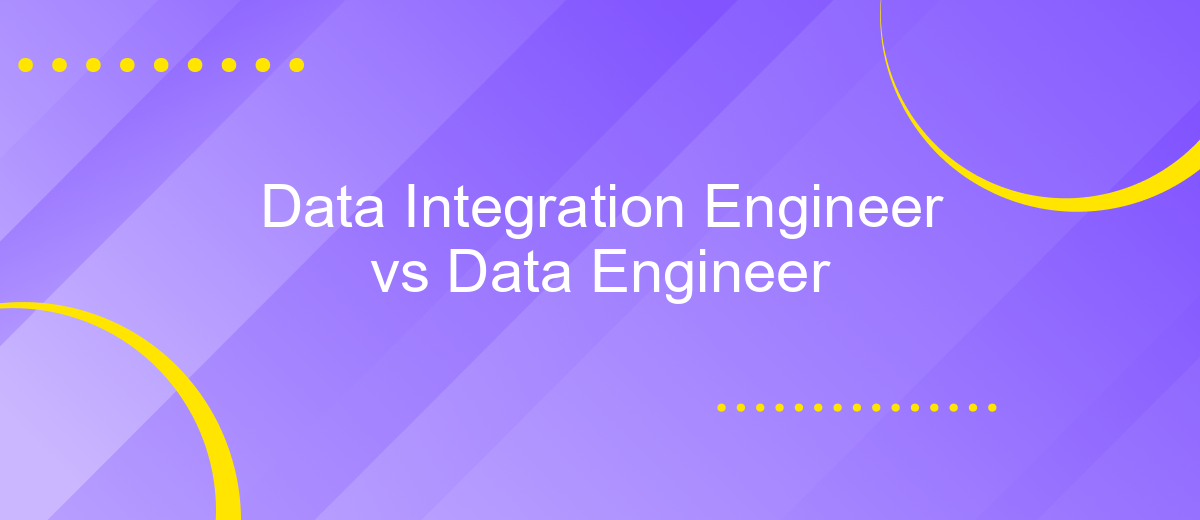Data Integration Engineer vs Data Engineer
In the rapidly evolving world of data management, understanding the distinct roles of a Data Integration Engineer and a Data Engineer is crucial. Both positions play pivotal roles in handling data, yet they focus on different aspects of the data lifecycle. This article delves into their unique responsibilities, skill sets, and how they contribute to the overall data strategy of an organization.
Introduction
In today's data-driven world, the roles of Data Integration Engineer and Data Engineer are often discussed and sometimes confused. Both positions are crucial for businesses aiming to leverage their data effectively, yet they focus on different aspects of data management and utilization.
- Data Integration Engineer: Specializes in connecting various data sources and ensuring seamless data flow between systems.
- Data Engineer: Focuses on designing, building, and maintaining the architecture that allows for efficient data processing and storage.
Understanding the distinctions between these roles is essential for organizations to build robust data strategies. Tools like ApiX-Drive can play a pivotal role in simplifying data integration tasks, allowing Data Integration Engineers to automate workflows and connect disparate systems effortlessly. By recognizing the unique contributions of both Data Integration Engineers and Data Engineers, businesses can better allocate resources and optimize their data operations.
Responsibilities

Data Integration Engineers are primarily responsible for designing, developing, and maintaining systems that enable seamless data flow between different applications and databases. They focus on integrating disparate data sources, ensuring data consistency, and optimizing data transfer processes. Utilizing tools like ApiX-Drive, they can automate and streamline data integration tasks, reducing manual effort and minimizing errors. Additionally, they work closely with stakeholders to understand integration requirements and ensure that data is accurately and efficiently shared across systems.
On the other hand, Data Engineers are tasked with building and maintaining the infrastructure needed for data generation, storage, and processing. They design and implement data pipelines, manage large-scale data warehouses, and ensure data is readily available for analysis. Their responsibilities also include optimizing data retrieval and ensuring the scalability and performance of data systems. Data Engineers often collaborate with Data Scientists and Analysts to support their data needs, enabling them to derive insights and make data-driven decisions.
Skills and Qualifications

When comparing Data Integration Engineers and Data Engineers, it is essential to understand their distinct skill sets and qualifications. Both roles require a strong foundation in data management, but they diverge in specific areas of expertise.
- Technical Proficiency: Data Engineers need expertise in programming languages such as Python, Java, and SQL, while Data Integration Engineers should be proficient in integration tools like ApiX-Drive, Talend, and MuleSoft.
- Data Modeling: Data Engineers must excel in creating and managing data models, whereas Data Integration Engineers focus on designing integration solutions that ensure seamless data flow across systems.
- Database Management: Both roles require knowledge of database systems, but Data Engineers often work with large-scale databases like Hadoop and Spark, whereas Data Integration Engineers might work with various databases to ensure data consistency and accuracy.
- Problem-Solving Skills: Both roles need strong analytical and problem-solving skills, but Data Integration Engineers should also be adept at troubleshooting integration issues and optimizing data workflows.
While both roles share some common skills, their focus areas differ significantly. Data Engineers concentrate on building robust data infrastructures, whereas Data Integration Engineers specialize in connecting disparate systems to create a cohesive data environment. Tools like ApiX-Drive can be crucial for Data Integration Engineers to streamline and automate data workflows efficiently.
Education and Training

Both Data Integration Engineers and Data Engineers require a solid foundation in computer science, data management, and software engineering. Typically, a bachelor's degree in computer science, information technology, or a related field is essential. Advanced positions may require a master's degree or specialized certifications.
Practical experience is crucial for both roles. Data Integration Engineers often focus on integrating various data sources and ensuring seamless data flow. They must be proficient in ETL (Extract, Transform, Load) processes and tools. On the other hand, Data Engineers concentrate on building and maintaining the architecture that allows data generation, storage, and access.
- Strong programming skills in languages like Python, SQL, and Java.
- Familiarity with data warehousing solutions such as Amazon Redshift or Google BigQuery.
- Experience with ETL tools like Apache NiFi or ApiX-Drive.
- Knowledge of cloud platforms like AWS, Azure, or Google Cloud.
Continuous learning is vital in these dynamic fields. Attending workshops, enrolling in online courses, and obtaining certifications can help professionals stay updated with the latest technologies and best practices. Practical experience, combined with formal education, ensures proficiency and expertise in handling complex data challenges.
- Automate the work of an online store or landing
- Empower through integration
- Don't spend money on programmers and integrators
- Save time by automating routine tasks
Career Path and Salary
Data Integration Engineers typically start their careers with a strong foundation in computer science, often obtaining degrees in related fields. As they gain experience, they specialize in integrating diverse data sources, utilizing tools like ApiX-Drive to automate and streamline processes. Career progression may lead them to senior roles where they oversee complex integration projects and mentor junior engineers. Salaries for Data Integration Engineers range from ,000 to 0,000 annually, depending on experience and location.
Data Engineers, on the other hand, often begin their careers with similar educational backgrounds but focus more on building and maintaining data architectures. They work extensively with big data technologies and cloud platforms. With experience, they can advance to roles such as Lead Data Engineer or Data Architect. Salaries for Data Engineers typically range from ,000 to 0,000 per year, influenced by their skill set and the complexity of the data systems they manage.
FAQ
What is the primary difference between a Data Integration Engineer and a Data Engineer?
What skills are essential for a Data Integration Engineer?
Can a Data Engineer perform the tasks of a Data Integration Engineer?
What tools are commonly used by Data Integration Engineers?
How do Data Engineers and Data Integration Engineers collaborate in a project?
Routine tasks take a lot of time from employees? Do they burn out, do not have enough working day for the main duties and important things? Do you understand that the only way out of this situation in modern realities is automation? Try Apix-Drive for free and make sure that the online connector in 5 minutes of setting up integration will remove a significant part of the routine from your life and free up time for you and your employees.


